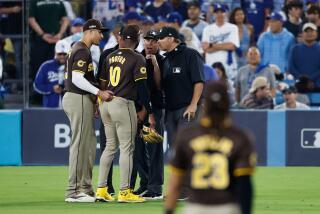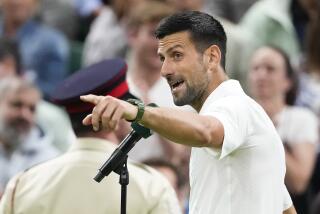When Fans on Course Turn Coarse
- Share via
AUGUSTA, Ga. — The signs read: “Quiet, Please.” And they mean it. They might be polite, but they mean it. Quiet, please. Shhhh. Hey, keep it down, do you mind? Hey! Hey, you . . . hey, thunder lungs! Keep a lid on it, will ya? People are trying to play golf here.
But something is changing.
Not everybody is listening.
There is something in the air in professional golf, and we don’t mean dimpled Dunlops.
A fringe element--a loud one--is becoming of legitimate concern to many golfers, including those who open play today at the Masters.
A new species of fan, a rude, unruly one that behaves as though at a baseball or football game, has been making himself (or, less frequently, herself) heard at PGA Tour events where library-like silence has long been taken for granted.
Even here at Augusta National, where galleries normally treat golfers with a worshipful respect, 1991 champion Ian Woosnam had to contend with hecklers who wanted the Welshman to fold on the final few holes.
His ears are still ringing with the sound of a spectator who, as Woosnam was focusing on an important shot, called out loudly: “Hey, Woosie! This ain’t no links course!”
And while this is hardly the sort of insult that, say, a baseball batter has long been accustomed to, this is entirely the point--that golfers aren’t accustomed to it.
Gary McCord, a golfer and broadcaster, says: “If golf crowds screamed all the time, the players would get used to it. They’d adjust. But it’s that one solitary voice that kills you, just when everything is quiet.
“In Japan, the camera shutters keep clicking while you’re playing. You get used to it. But we’re not used to it here.”
Golfers are not eager to be thought of as pampered players who can’t stand the slightest commotion, or to tell paying customers how to behave.
Yet different games are governed by different rules.
“You wouldn’t yell at somebody playing chess,” Peter Jacobsen said. “And, even if you did, it isn’t like you would be interrupting him in the middle of his backswing.
“He can recover. We can’t.”
And whereas even tennis players must adjust to audiences taking sides, golfers aren’t generally accustomed to someone openly rooting against them.
Davis Love III seemed genuinely distressed that at the recent L.A. Open he was treated virtually as a villain while in contention against the popular Fred Couples, who eventually won.
“I’m glad they like Fred,” Love said, “but what did I do wrong to anybody? Why would anybody be happy to see me miss a putt?”
Two weeks ago, before winning the Nabisco Dinah Shore event of the LPGA tour, Dottie Mochrie was lining up a par putt on the 17th green. A man in the gallery yelled: “Loser!”
Mochrie said she used it as incentive, that it fired her up. What would she have said, though, had she blown the tournament on the 18th hole?
After the 1986 U.S. Open, Greg Norman bristled for weeks after run-ins with noisy spectators at Shinnecock Hills in Southampton, N.Y.
Norman said: “They didn’t care what they said or when they said it. It was like a bloody basketball game.”
And it is certainly true that athletes in other sports must tolerate this sort of thing all the time. Before Monday’s NCAA basketball final, Michigan freshman Chris Webber said he once watched a game at which Duke’s students inflated balloons while an opponent prepared to shoot a free throw, then popped the balloons at the instant the player released the ball.
Was Webber offended?
“No, it was funny,” he said.
On the golf tour, it is not uncommon for spectators to loudly show their support. There are always characters like the Woo Man, who, after every tee shot, no matter which direction it might be heading, calls out: “Wooooo!” Or the other famous kibitzer who often can be heard on television telling a player: “You the man!”
What is uncommon is for traditionally reserved spectators to be indulging in the active harassment of players.
Woosnam, who grew up playing on links courses, was not expecting to be heckled in the hour of his greatest triumph.
He said: “I was shocked by the number of spectators who made it clear that they didn’t want me to win the Masters. Like they personally blamed me for Tom Watson not winning.”
Watson personally took it upon himself to intervene.
“Tom told me: ‘Let’s find out where they work and go scream at them ,’ ” Woosnam said.
And did they?
“No,” Woosnam said, laughing, “but we haven’t totally abandoned the idea.”
More to Read
Go beyond the scoreboard
Get the latest on L.A.'s teams in the daily Sports Report newsletter.
You may occasionally receive promotional content from the Los Angeles Times.










